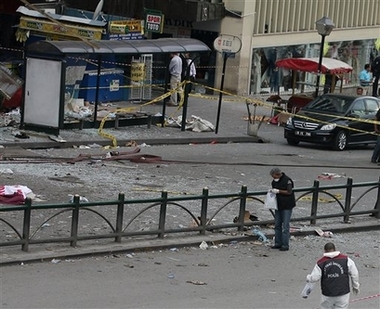Bomb in Turkish capital kills 6
(AP)Updated: 2007-05-23 09:52
ANKARA, Turkey - A bomb exploded Tuesday at busy shopping mall in Turkey's capital, damaging shops and hurling glass over one of the city's oldest neighborhoods. At least six people were killed and 80 injured.
"Is it a suicide bomber or a parcel bomb? Technical teams are working on this," Erdogan told reporters after visiting the scene. "We have always said terror can strike anyone, anywhere."
Private NTV television, quoting police officials, said the bomb was made of plastic explosives, the type favored by separatist Kurdish rebels. Militant leftists and Islamic extremists also operate in Turkey.
Erdogan said four Turks and one Pakistani were killed in the blast.
Pakistani Embassy spokesman Abdul Majeed Niazi said eight Pakistanis were injured, but no Pakistanis died. It was unclear why his account conflicted with that of the prime minister. The Pakistanis were in Ankara for a weeklong international defense industry fair about 12 miles from the shopping mall.
A body, covered in a white sheet, lay outside the building, surrounded by shards of glass and other debris. Bloodied survivors, their clothes torn, were helped to ambulances, TV footage showed.
"We were cleaning the windows when the pressure from the blast pushed us to the ground," said Murat Coskun, who owns a nearby cell phone shop. "Everything was covered in dust. I could only hear people screaming."
The blast occurred in the Ulus neighborhood, one of the oldest parts of Ankara, near museums and the old parliament house. The shopping mall, called Anafartalar, sells mostly clothes and textiles.
Health Minister Recep Akdag said about 80 people were injured, most of them only slightly.
"Who feeds terrorist groups? Who's behind them? That's what we need to look at," said Gen. Yasar Buyukanit, the chief of the military.
Buyukanit has accused Europe of not doing enough to prevent sympathizers from providing aid to the Kurdish rebel group PKK, deemed a terrorist organization by the United States and the European Union.
Many Kurds have emigrated to European countries, fleeing the fighting or searching for a better life. PKK sympathizers in European countries have helped the group establish offices and fund some of their activities. Turkey has pressed Denmark to close down a satellite television station which it believes to be a PKK mouthpiece.
There is growing impatience in Turkey over how to deal with Kurdish rebels, and the government has not ruled out military operations against their bases in northern Iraq. The United States opposes that idea, for fear of further destabilizing Iraq.
The US Embassy in Ankara expressed "shock and horror" over the attack and said the United States "remains steadfast in our determination to work together with the government of Turkey to combat terrorism in all its forms."
In September, suspected Kurdish rebels set off a bomb at a bus stop in Turkey's largest majority Kurdish city, Diyarbakir, killing 10 people. A month earlier, a hard-line Kurdish militant group claimed responsibility for a bus bombing in the Mediterranean resort of Marmaris that injured 20 people, including 10 Britons.
In recent weeks, Turkey has also seen political turmoil pitting the Islamic-leaning government against the military-backed secular opposition, which has staged huge anti-government protests. The ruling party's presidential candidate was forced to abandon his bid for the office, and early general elections were called for July 22.
On May 12, a bomb in the port city of Izmir killed one person and injured 14 others a day before an anti-government demonstration that drew more than 1 million people. It was unclear whether the blast was linked to the protest.
In 2003, Al-Qaida-linked suicide truck bombers attacked two synagogues, the British Consulate and a British bank in Istanbul, killing 58 people.
|
||
|
||
|
|

